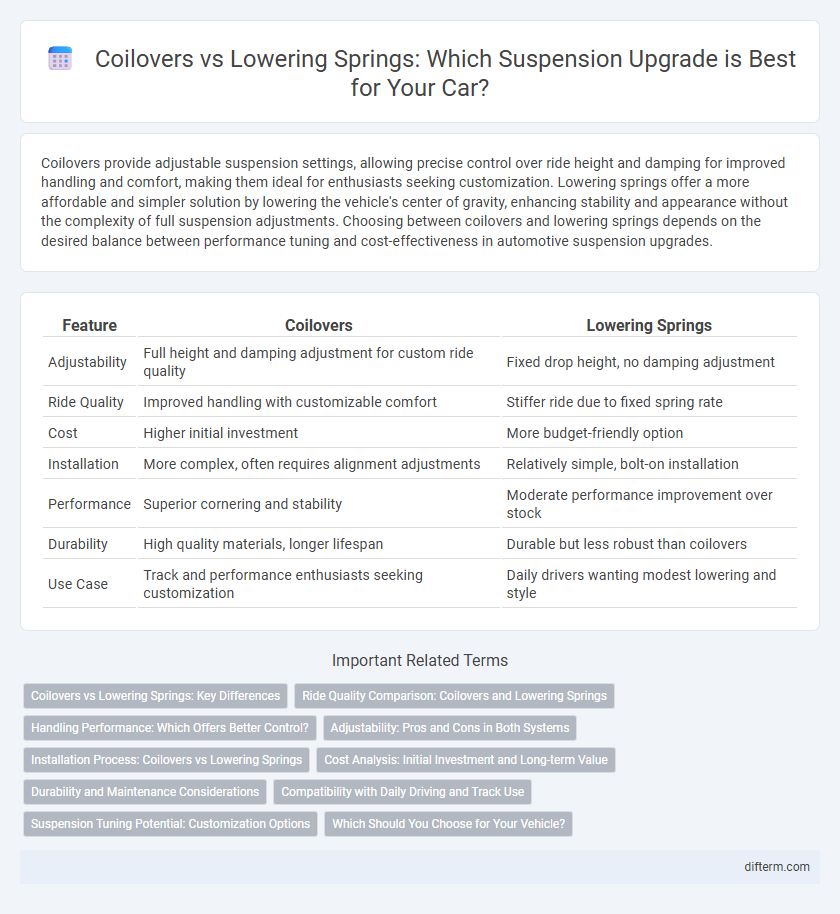Coilovers provide adjustable suspension settings, allowing precise control over ride height and damping for improved handling and comfort, making them ideal for enthusiasts seeking customization. Lowering springs offer a more affordable and simpler solution by lowering the vehicle's center of gravity, enhancing stability and appearance without the complexity of full suspension adjustments. Choosing between coilovers and lowering springs depends on the desired balance between performance tuning and cost-effectiveness in automotive suspension upgrades.
Table of Comparison
| Feature | Coilovers | Lowering Springs |
|---|---|---|
| Adjustability | Full height and damping adjustment for custom ride quality | Fixed drop height, no damping adjustment |
| Ride Quality | Improved handling with customizable comfort | Stiffer ride due to fixed spring rate |
| Cost | Higher initial investment | More budget-friendly option |
| Installation | More complex, often requires alignment adjustments | Relatively simple, bolt-on installation |
| Performance | Superior cornering and stability | Moderate performance improvement over stock |
| Durability | High quality materials, longer lifespan | Durable but less robust than coilovers |
| Use Case | Track and performance enthusiasts seeking customization | Daily drivers wanting modest lowering and style |
Coilovers vs Lowering Springs: Key Differences
Coilovers offer adjustable ride height and damping settings, providing superior customization compared to lowering springs, which only reduce ride height with fixed stiffness. Unlike lowering springs, coilovers improve handling precision by allowing fine-tuning of suspension dynamics tailored to driving preferences and road conditions. Coilovers generally cost more but deliver enhanced performance benefits, making them ideal for enthusiasts seeking both aesthetic and functional upgrades.
Ride Quality Comparison: Coilovers and Lowering Springs
Coilovers offer adjustable ride height and damping settings, allowing for precise customization of ride quality tailored to varying driving conditions. Lowering springs provide a fixed drop with improved handling over stock suspension but can result in a firmer, less comfortable ride due to their static spring rate. The ability of coilovers to fine-tune both compression and rebound damping makes them superior for achieving an optimal balance between performance and comfort.
Handling Performance: Which Offers Better Control?
Coilovers provide superior handling performance due to their adjustable ride height and damping settings, allowing for precise tuning tailored to various driving conditions and track requirements. Lowering springs offer a fixed drop, improving center of gravity and cornering stability but lack the customization needed for optimal control in dynamic situations. Enthusiasts seeking enhanced handling and responsiveness often prefer coilovers for their adaptability and improved ride quality.
Adjustability: Pros and Cons in Both Systems
Coilovers offer superior adjustability with customizable ride height, damping, and rebound settings, providing precise control over suspension performance for varied driving conditions. Lowering springs are fixed-height components that enhance aesthetics and handling but lack the ability to fine-tune suspension settings, limiting adaptability. While coilovers can be more expensive and complex to install and maintain, their adjustability benefits drivers seeking optimized performance, whereas lowering springs suit those prioritizing cost-effectiveness and simplicity.
Installation Process: Coilovers vs Lowering Springs
Coilovers offer a modular installation process combining shocks and springs into a single unit, often requiring precise adjustments for ride height and damping settings, making the setup more complex and time-consuming compared to lowering springs. Lowering springs replace only the factory springs while utilizing existing shocks, resulting in a simpler and quicker installation with fewer adjustments needed. Professional alignment is recommended for both options to ensure optimal handling and tire wear after installation.
Cost Analysis: Initial Investment and Long-term Value
Coilovers typically require a higher initial investment, ranging from $800 to $2,500, depending on brand and features, while lowering springs cost between $150 and $400. Despite the upfront expense, coilovers offer greater long-term value through adjustable ride height and improved handling, reducing the need for additional suspension upgrades. Lowering springs provide limited adjustability and may necessitate further modifications, potentially increasing overall expenses over time.
Durability and Maintenance Considerations
Coilovers offer superior durability due to their adjustable damping mechanisms and robust construction, allowing for tailored performance over varied driving conditions. Lowering springs provide a simpler design with fewer components, resulting in lower maintenance requirements but potentially faster wear and tear under aggressive driving. Choosing coilovers often leads to longer-term reliability and easier maintenance adjustments, while lowering springs offer cost-effective and minimal upkeep for moderate use.
Compatibility with Daily Driving and Track Use
Coilovers offer superior adjustability in ride height and damping settings, making them ideal for both daily driving comfort and precise track performance. Lowering springs provide a fixed drop and stiffer ride, enhancing handling but often compromising ride quality on rough roads. Compatibility with various vehicle models and driving conditions must be considered, as coilovers adapt better to mixed-use scenarios, while lowering springs suit enthusiasts prioritizing a more aggressive stance and occasional spirited driving.
Suspension Tuning Potential: Customization Options
Coilovers offer superior suspension tuning potential with adjustable ride height, damping, and sometimes camber, allowing precise customization for performance and ride comfort. Lowering springs provide a fixed drop height and limited tuning, making them less versatile for enthusiasts seeking tailored suspension setups. Enthusiasts aiming for optimal handling and adaptability prefer coilovers for their comprehensive customization options in automotive suspension tuning.
Which Should You Choose for Your Vehicle?
Coilovers offer adjustable ride height and damping settings, providing superior customization for performance and comfort compared to lowering springs, which provide a fixed drop and limited tuning options. Coilovers are ideal for enthusiasts seeking precise handling and the ability to adapt suspension characteristics to different driving conditions. Lowering springs suit drivers looking for an affordable, simple upgrade that improves stance and reduces body roll without the complexity of full suspension adjustment.
coilovers vs lowering springs Infographic

 difterm.com
difterm.com